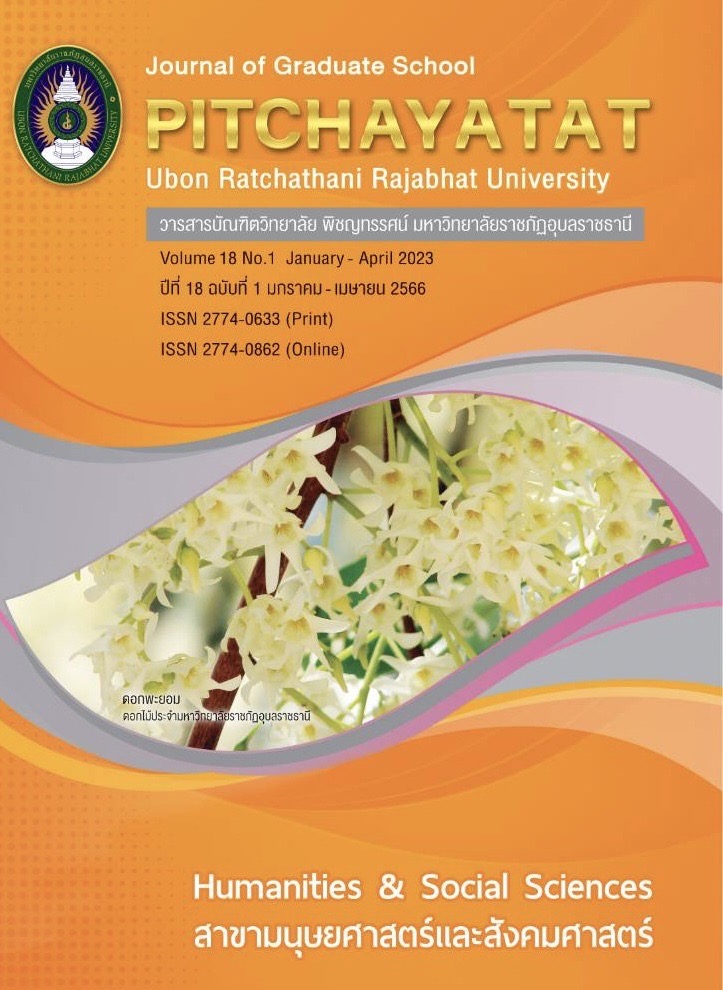สภาพ ความต้องการจำเป็นและแนวทางพัฒนาการนำเทคโนโลยีดิจิทัลมาใช้ในการจัดการเรียนรู้ในโรงเรียน สังกัดสำนักงานเขตพื้นที่การศึกษาประถมศึกษาบึงกาฬ
คำสำคัญ:
สภาพปัจจุบัน , สภาพที่พึงประสงค์ , ความต้องการจำเป็น , แนวทางพัฒนา , เทคโนโลยีดิจิทัลบทคัดย่อ
การวิจัยนี้มีวัตถุประสงค์เพื่อ 1) ศึกษาสภาพปัจจุบันและสภาพพึงประสงค์ 2) ประเมินความต้องการจำเป็น และ 3) พัฒนาแนวทางการนำเทคโนโลยีดิจิทัลมาใช้ในการจัดการเรียนรู้ในโรงเรียน ตัวอย่าง ได้แก่ ผู้บริหารและครู รวมจำนวน 303 คน กำหนดขนาดตัวอย่างโดยใช้เกณฑ์ร้อยละ ได้มาโดยการสุ่มแบบแบ่งชั้น เครื่องมือที่ใช้ได้แก่ แบบสอบถามสภาพปัจจุบัน แบบสอบถามสภาพที่พึงประสงค์ แบบสัมภาษณ์แบบมีโครงสร้าง แบบประเมินความเหมาะสมและความเป็นไปได้ สถิติที่ใช้ได้แก่ ร้อยละ ค่าเฉลี่ย ส่วนเบี่ยงเบนมาตรฐาน และดัชนีการจัดลำดับความสำคัญของความต้องการจำเป็นแบบปรับปรุง
ผลการวิจัยพบว่า
- สภาพปัจจุบัน โดยรวมอยู่ในระดับมาก สภาพที่พึงประสงค์ โดยรวมอยู่ในระดับมากที่สุด
- ความต้องการจำเป็น มีค่าสูงกว่าค่าโดยรวม ได้แก่ ด้านการเข้าถึงระบบเครือข่ายเทคโนโลยีดิจิทัลและด้านการออกแบบการจัดการเรียนรู้ตามลำดับ
- แนวทางการพัฒนา 1) ด้านการเข้าถึงระบบเครือข่ายเทคโนโลยีดิจิทัล หน่วยงานที่เกี่ยวข้องและสถานศึกษาควรจัดสรรทรัพยากรเทคโนโลยีดิจิทัลให้เพียงพอต่อความต้องการของสถานศึกษา และควรวางแผนในการจำกัดการเข้าถึงเพื่อรักษาความปลอดภัยบนโลกไซเบอร์ 2) ด้านทัศนคติที่ดีต่อการใช้เทคโนโลยีดิจิทัล ผู้บริหารและครูควรเปิดใจยอมรับและเห็นถึงประโยชน์ของการใช้เทคโนโลยีดิจิทัล 3) ด้านทักษะความรู้ในการใช้เทคโนโลยีดิจิทัล ครูควรพร้อมที่จะพัฒนาตนเอง เพื่อให้มีความรู้ความเข้าใจในการใช้เทคโนโลยีดิจิทัล โดยสามารถใช้เครื่องมืออุปกรณ์ดิจิทัลในเบื้องต้นได้ 4) ด้านการออกแบบการจัดการเรียนรู้และนวัตกรรม ครูควรออกแบบกิจกรรมการเรียนรู้โดยยึดผู้เรียนเป็นสำคัญ วิเคราะห์หลักสูตรเพื่อออกแบบเนื้อหา หน่วยการเรียนรู้ให้มีความหลากหลาย ถูกต้อง น่าเชื่อถือ 5) ด้านคุณธรรมและความเป็นพลเมืองดิจิทัล ครูควรตระหนักรู้ถึงคุณธรรมจริยธรรม ลิขสิทธิ์ทางปัญญา สิทธิ เสรีภาพ ความรับผิดชอบ โดยใช้วิจารณญาณในการคิดวิเคราะห์ตรวจสอบแหล่งที่มาของข้อมูล และการป้องกันข้อมูลส่วนตัว ผลการประเมินแนวทางพัฒนาโดยรวมพบว่า มีความเหมาะสมอยู่ในระดับมากที่สุด และมีความเป็นไปได้ อยู่ในระดับมาก
เอกสารอ้างอิง
กรณ์สิณี ฐิติกรประภาพงศ์. “การจัดการเทคโนโลยีสารสนเทศที่ส่งผลต่อการใช้อินเทอร์เน็ตในการจัดกระบวนการเรียนรู้ของครูในสถานศึกษาสังกัดสำนักงานเขตพื้นที่การศึกษาประถมศึกษาเพชรบุรี เขต 2,” Veridian E-Journal, Slipakorn University. 8, 3 (กันยายน-ธันวาคม 2558): 1-13.
เขตพื้นที่การศึกษาประถมศึกษาบึงกาฬ, สำนักงาน. รายงานผลการประเมินตนเองของสถานศึกษา ปีการศึกษา 2564. (ออนไลน์) 2565 (อ้างเมื่อ 3 พฤษภาคม 2565). จาก https://www.bkn.go.th.
จิรพล ศศิวรเดช. ปัญหาและแนวทางการพัฒนาการใช้เทคโนโลยีสารสนเทศในโรงเรียนวัดพลา สังกัดสำนักงานเขตพื้นที่การศึกษาประถมศึกษาระยอง เขต 1. วิทยานิพนธ์การศึกษามหาบัณฑิต มหาวิทยาลัยบูรพา, 2560.
เจริญ ภูวิจิตร์. การจัดการเรียนรู้ทางออนไลน์อย่างมีประสิทธิภาพในยุคดิจิทัล (Efficiency in Online Learning Management of Digital Age). ออนไลน์ 2564 (อ้างเมื่อ 25 ตุลาคม 2565). จาก http://www.nidtep.go.th/2017/publish/doc/20210827.pdf
ฉัตรพงศ์ ชูแสงนิล. ยุคแห่งเมืองดิจิทัล คลังความรู้ SciMath. (ออนไลน์) 2565 (อ้างเมื่อ 20 พฤษภาคม 2565). จาก https://www.scimath.org , article-technology> itemn
เทคโนโลยีสารสนเทศและการสื่อสาร, กระทรวง. Digital Thailand. กรุงเทพ: กระทรวงฯ, 2559.
บุญชม ศรีสะอาด. การวิจัยเบื้องต้นฉบับปรับปรุงใหม่. พิมพ์ครั้งที่ 9. กรุงเทพฯ: สุวีริยาสาส์น, 2560.
ปลัดกระทรวงศึกษาธิการ, สำนักงาน. แผนพัฒนาทักษะด้านดิจิทัลของข้าราชการและบุคลากรสังกัดสำนักงานปลัดกระทรวงศึกษาธิการ พ.ศ.2562–2565. (ออนไลน์) 2565 (อ้างเมื่อ 18 เมษายน 2565). จาก http://www.bga.moe.go.th/2018/wp-content/uploads/2019/09/เล่มแผนพัฒนาทักษะดิจิทัล62-65.pdf.
พิชญ์ สินีมะโน. “ผลกระทบจากการเปลี่ยนแปลงในยุค Digital Disruption ต่อการศึกษา The Impact Of Digital Disruption to the Education,” วารสารครุศาสตร์อุตสาหกรรม. 8, 1 (มกราคม–เมษายน 2562): 1-6.
ภรณี ศิริวิศาลสุวรรณ. การพัฒนาหลักสูตรเสริมสร้างทักษะชีวิตในยุคดิจิทัลสำหรับนักเรียนระดับชั้นมัธยมศึกษาตอนต้นของโรงเรียนสังกัดกรุงเทพมหานคร. วิทยานิพนธ์ปรัชญาดุษฎีบัณฑิต มหาวิทยาลัยศิลปากร, 2562.
ลักษมี คงลาก และคณะ. การจัดทำ Fact Sheet "ความฉลาดทางดิจิตอล" (Digital Intelligence: DO) และการศึกษาการรังแกกันบนโลกไซเบอร์ของวัยรุ่น. กรุงเทพฯ: สถาบันสื่อเด็กและเยาวชน, 2561.
เลขาธิการสภาการศึกษา, สำนักงาน. แนวปฏิบัติของการสร้างและส่งเสริมการรู้ดิจิทัลสำหรับครู. กรุงเทพฯ: พริกหวานกราฟฟิค, 2562.
วรพจน์ วงศ์กิจรุ่งเรือง. คู่มือพลเมืองดิจิทัลในโครงการ: การพัฒนาทักษะและการเป็นพลเมืองดิจิทัล. กรุงเทพฯ: สำนักงานส่งเสริมเศรษฐกิจดิจิทัล กระทรวงดิจิทัลเพื่อเศรษฐกิจและสังคม, 2561.
วิภาดา ผลาเลิศ. สภาพการดำเนินงานเทคโนโลยีสารสนเทศและการสื่อสาร ตามแผนแม่บทเทคโนโลยีสารสนเทศของโรงเรียน สังกัดสำนักงานเขตพื้นที่การศึกษามัธยมศึกษา เขต 24. วิทยานิพนธ์การศึกษามหาบัณฑิต มหาวิทยาลัยราชภัฏร้อยเอ็ด, 2557.
วารินทร์ วิตูล. แนวทางการบริหารจัดการเพื่อเพิ่มประสิทธิภาพการใช้เทคโนโลยีสารสนเทศในการปฏิบัติงาน ของบุคลากรทางการศึกษาในสังกัดสำนักงานเขตพื้นที่การศึกษาประถมศึกษาเชียงราย เขต 2. การศึกษาค้นคว้าอิสระครุศาสตรมหาบัณฑิตเชียงราย มหาวิทยาลัยราชภัฏเชียงราย, 2558.
วิชัย วงษ์ใหญ่. Digital Learning. กรุงเทพฯ: ศูนย์ผู้นำนวัตกรรมหลักสูตรและการเรียนรู้, 2562.
วิทยา ดำรงเกียรติศักดิ์. พลเมืองดิจิทัล (Digital Citizenship), (ออนไลน์) 2565 (อ้างเมื่อ 18 เมษายน 2565). จาก http://www.infocommmju.com/icarticle/images/stories/icarticles/ajwittayal/digital/ Digital_Citizenship.pdf.
ศึกษาธิการ, กระทรวง. แผนพัฒนาการศึกษาของกระทรวงศึกษาธิการ ฉบับที่ 12 (พ.ศ. 2560-2564). (ออนไลน์) 2565 (อ้างเมื่อ 18 เมษายน 2565). จาก http://waa.inter.nstda.or.th/stks/pub/2017/20170313-Education-Development-Plan-12.pdf.
สงบ อินทรมณี. “การบริหารสถานศึกษาในยุคดิจิทัล,” วารสารวิชาการมหาวิทยาลัยการจัดการและเทคโนโลยีอีสเทิร์น. 16, 1 (มกราคม–มิถุนายน 2562): 16.
สรานนท์ อินทนนท์. ความฉลาดทางดิจิทัล. กรุงเทพฯ: มูลนิธิส่งเสริมสื่อเด็กและเยาวชน(สสย), 2561.
สุธน ศรีศักดิ์บางเตย. “แนวทางพัฒนาการใช้เทคโนโลยีสารสนเทศและการสื่อสารในโรงเรียนพระแท่นดงรังวิทยาคาร,” วารสาร มจร พุทธปัญญาปริทรรศน์. 4, 3 (กันยายน-ธันวาคม 2562): 463-464.
สุวิมล ว่องวาณิช. การวิจัยประเมินความต้องการจำเป็น. พิมพ์ครั้งที่ 3. กรุงเทพ ฯ: สำนักพิมพ์แห่งจุฬาลงกรณ์มหาวิทยาลัย, 2558.
อติพร เกิดเรือง. “การส่งเสริมการเรียนรู้ในศตวรรษที่ 21 เพื่อรองรับสังคมไทยในยุคดิจิทัล,” วารสารวิชาการ มหาวิทยาลัยราชภัฏลำปาง. 183, 1 (มกราคม - มิถุนายน 2560): 179.
อมรรัตน์ จินดา. สภาพปัญหาและแนวทางการส่งเสริมการใช้เทคโนโลยีสารสนเทศและการสื่อสารเพื่อการศึกษาสำหรับสถานศึกษาในสังกัดสำนักงานเขตพื้นที่การศึกษาประถม ศึกษานครปฐม เขต 2. การค้นคว้าแบบอิสระศึกษาศาสตร มหาบัณฑิตมหาวิทยาลัยศิลปากร, 2558.
อรุณโรจน์ จิตร์ภิรมย์ศรี. “ปัจจัยด้านความรู้ ทัศนคติ และแนวโน้มต่อการใช้เทคโนโลยีอินเทอร์เน็ตในทุกสรรพสิ่งของผู้ใช้เทคโนโลยีฯ ในกรุงเทพมหานครและปริมณฑล,” วารสารศาสตรมหาบัณฑิต สาขาวิชาการจัดการการสื่อสารองค์กรมหาวิทยาลัยธรรมศาสตร์. 20, 2 (กรกฎาคม–ธันวาคม 2564): 60.
Agarwal, N. and F. Ahmed. “Developing collective learning extension for rapidly evolving information system courses,” Education and Information Technologies. 22, 1 (January2017): 7-37.
Ribble, M. and G. Bailey. Digital Citizenship in Schools. Eugene, OR: ISTE, Digital Citizenship: Using Technology Appropriately, 2007.
UNESCO. A Policy review: building digital citizenship in Asia-Pacific through safe,effective and responsible use of ICT. (online) 2022 (Cited 25 December 2022). https://unesdoc. unesco.org/notice?id=p::usmarcdef_000246813
ดาวน์โหลด
เผยแพร่แล้ว
รูปแบบการอ้างอิง
ฉบับ
ประเภทบทความ
สัญญาอนุญาต
ลิขสิทธิ์ (c) 2023 วารสารบัณฑิตวิทยาลัย พิชญทรรศน์ มหาวิทยาลัยราชภัฏอุบลราชธานี

อนุญาตภายใต้เงื่อนไข Creative Commons Attribution-NonCommercial-NoDerivatives 4.0 International License.
บทความทุกเรื่องได้รับการตรวจความถูกต้องทางวิชาการโดยผู้ทรงคุณวุฒิภายนอกอย่างน้อย 3 คน ความคิดเห็นในวารสารพิชญทรรศน์เป็นความคิดเห็นของผู้นิพนธ์มิใช่ความคิดเห็นของผู้จัดทำ จึงมิใช่ความรับผิดชอบของวารสารพิชญทรรศน์ และบทความในวารสารพิชญทรรศน์สงวนสิทธิ์ตามกฎหมายไทย การจะนำไปเผยแพร่ต้องได้รับอนุญาตเป็นลายลักษณ์อักษรจากกองบรรณาธิการ





